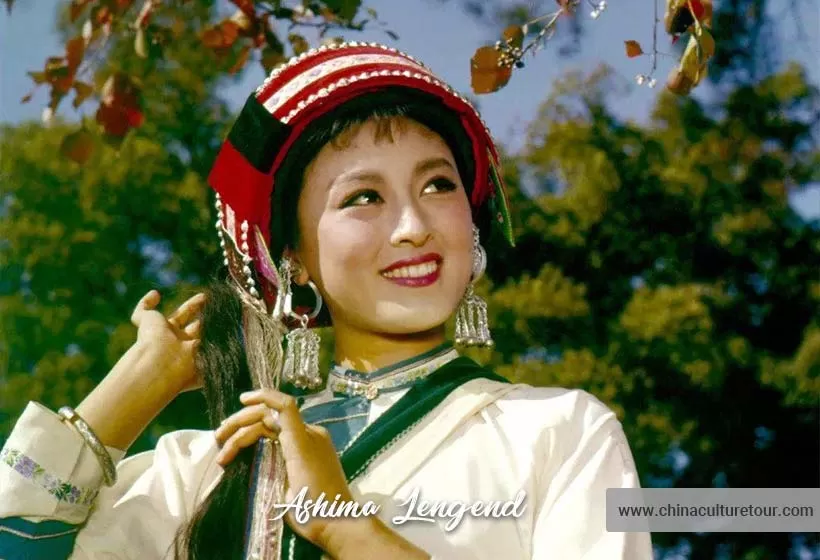Story of Miss Ashima
The story of Ashima belongs to the Sani people, who are spread throughout the Yi Autonomous County in Shilin, Yunnan Province, and form part of the Yi ethnic group. People recite or sing the story of Ashima, which is an epic poem rich in romance and allegorical language. The tale of Ashima’s courage and fortitude while resisting a power greater than her own reflects timeless human aspirations, that darkness will be replaced by light, evil by virtue, and oppression and bondage will be replaced by freedom. It also reflects the Sani character and spirit in that they prefer to die rather than surrender.
 Film: Ashima
Film: AshimaAshima was originally an oral poem in the Sani Yi language, combining collective wisdom, memory, and tradition, and is much loved amongst the Sani people. It is particularly popular in the Sani areas in the north and south of Yi Autonomous County, Shilin, Yunnan Province, where two very similar schools or versions exist. Ashima is an extended song using various rhetorical devices such as foreshadowing, exaggeration, and irony as well as sophisticated techniques including puns or homophones, repetition of the last word of a line to start the next (anadiplosis), using one noun to apply quite surprisingly to different actions (eg “she opened the door and her heart”, known as zeugma) and always rich in metaphor. If it is sung there are many tunes such as “happy tune” (Xidiao), “old man tune” (Laoren Diao), “sad tune” (Beidiao), “crying tune” (Kudiao), “scolding tune” (Madiao) and others. There are no fixed occasions when this poem is performed. It can be sung or narrated at weddings, memorial ceremonies, sacrificial rites time, at work time, and or any other time that people get together.
 Film: Ashima
Film: AshimaSince the 1950s Ashima has been widely translated into many languages, including English, French, German, Spanish, Russian, Japanese, and Korean. It has also become well-known overseas following the release of Chinese stories in various magazines and collections. It has been produced in Japan as a radio play, opera, and children’s drama. At home in China, it has been produced as a film, Peking opera, Yunnan opera, opera, dance drama, and Sani opera and performed throughout the country. In 1982 the first Chinese full-color, wide-screen, stereo music opera Ashima won the Best Dance Prize at the Santander International Festival in Spain.
As the pace of social change increases, affecting lifestyles, educational systems, and minority language usage, the inheritance of Ashima is in danger of being lost.
GREAT FAMILY CHINA TOUR
JULY 2024 We wanted to thank Grace at China Culture tour for organizing a great tour of China. We enjoyed our Beijing - Xian-Chengdu -Guilin -Yangshuo - Shanghai trip. Our local guides Bruce in Beijing, Susan in Xian, Jane in Chengdu, Mike in Guilin and Mary in Shanghai took care of us…read more details »
Teng Han L from SINGAPORE
Ready to Create a Unique Dream Travel?

